
2023-2024

Last


2023-2024

Last
Croeso,
Welcome to Libanus Primary School’s Prospectus. I hope it provides you with the information you require. If you have any further questions please contact our school office.
IhonestlybelievethatLibanusisaplacewherechildrencansoar!Our originalbuildinghasbeenonour site since 1915, educating children for over a hundred years! I have had the pleasure of leading the teamhere since joining in 2014.
Our incredibly special name Libanus is the Welsh word for Lebanon, named after Libanus Chapel built in 1825 nearby to our school. We have embraced our unusual name by incorporating the image of Lebanon Mountain onto our logo and naming our classes after the bushes and trees that grow on the mountain.
We have an extraordinarily strong identity at Libanus, and you will hear us describe our pupils as true Libanusians!PupilsfollowourrulesofReady,RespectfulandSafeandlivethroughour valuesbyhaving aLoveoflearning,havingIntegrity,beingBrave,Appreciatingbeautyandexcellence,beingNice,being United and exercising Self-control.
Children’s wellbeingis at thecentre of everything wedo, and we have builtour community, curriculum, and opportunity for pupil voice around the needs of our children. We are constantly looking for opportunities to improve the experiences that our children have through their learning, visits and visitors and enrichment activities.
Governors, parents, staff, and our community have all played their part in the extensive development ofoursitewhichnowincludesastudio,cookingareas,aforestarea,trimtrails,cyclingfacilities,more access to outdoors from classrooms and much more.Watch this space for our next improvements!
Libanusisahappyschoolandawonderfulplacetobe.Iamalwayssoproudtoreceivepositivecomments from visitors to our school or from people who meet our pupils. The comments always complement our fantasticethosandthewaythatourpupilsinteractwitheachotherandwithadults.Ourteamofstaff are all highly committed and proud to be part of such a wonderful school.
Together our Libanus community gives our children the:
‘Roots to grow and wings to fly’ ‘Greiddfa i tyfiac adenydd i hedfan.’
Diolch yn fawr a dymuniadau gorau,
Nicola J Williams MAEd NPQH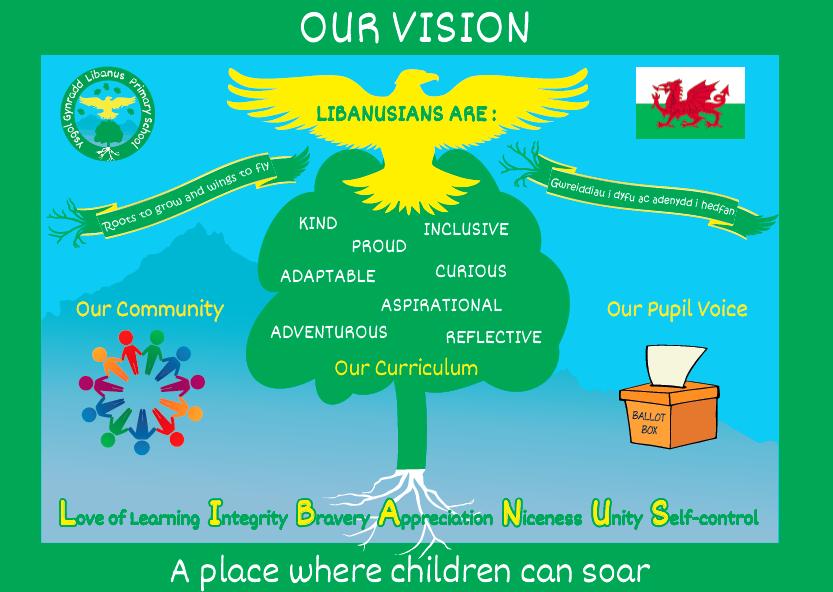
Curious
Motivated
Workethic
Enthusiasm
Enjoyment
Respectful Honest Open mindedness Loyalty
Brave Courage
Well mannered
Good listener
Empathy
Understanding
Humility
Acceptance
Polite Friendly Caring Loving Kind
Ability tomake friends Manners
Compassion Collaboration Teamwork
Sharing Resilient Active Ready
Tactfulness
Perseverance
Ability todeal with conflict and negativity
Positive attitude
Flexible and adaptable
Calmness
Punctuality
Self-discipline
Patience
Our Staff
Head teacher: Mrs N Williams
Deputy Head teacher: Mrs L Richards
Mrs L Blackwell
Mrs T Crandon
Mrs. L Williams
Mrs C Henshall
Mrs R Brayley
Miss A Bowen
Miss O Smith
Mrs T Symonds (HLTA)
Mrs K Reakes (HLTA)
Miss C Adams
Mrs J Blakeney
Mrs J Jones
Miss C Daniels
Office Manager: Mrs H Davies
Teachers
Mrs. R Cox
Mrs A Curtis
Mrs F Carthew
Miss E Suter
Mr M Carthew
Mrs E Thornton
Additional Practitioners
Mrs S Spillet
Mrs H Jefferies
Mrs G Clark
Mrs C Bevan
Mrs A Kenting
Mrs R Parnell
Administrative Assistant for attendance and pupil welfare: Mrs L Clifford
School Caretaker: Mr S Reed
Kitchen Staff: Mrs L Warry, Mrs Y Hayden, Mrs M Mason, Mrs L Torres
School Cleaners: Mrs T Hardman, Mrs C Kinsey, Mrs D Bridge, Ms N Bates, Ms K Hemmings
Mrs C Kinsey
Mrs A Easthope
Mrs Y Dury
Mrs S Elworthy
Mrs E Guest
Mrs J Harrison
Lunchtime Supervisors
Mrs C Greenaway
Mrs M Tudball
Mrs M Martin
Mrs C Lewis
Mrs S Keeling
Our Governing Body
Community
Local Authority
Teacher Governor
Staff Governor
Parent Governors
Head Teacher Governor
Observer
Minor Authority Representative
Mrs C. Williams (Vice Chairperson)
Mrs R. Jones
Mr R. Coles
Mrs M. Moore
Mr I. Penrose
Mrs A. Curtis
Mrs K. Reakes
Mrs R. Jenkins (Chairperson)
Mr S. Williams
Mrs D. Williams
Mrs N. Williams
Mrs L. Richards
Cllr. C. Erasmus
Regular meetings of the school Governors are held in the school.
TheGovernorsareresponsibleforthegeneralmanagementoftheschool,includingissuessuch as curriculum, organisation, staffing and finance.
The schoolis also fortunate to have averydedicated ‘FriendsofLibanus’ (FOLPS) committee, which meets regularly to organise events throughout the year. They are always on the lookout for new members, who would like to help in any way. Please contact the school if you are interested.
It is the Local Authority’s policy to provide all 3 year old children with a funded part-time Nursery place. Children are admitted into our Nursery the term after their third birthday. Application forms are available on-line. On entering your child’s date of birth, you will be provided with the correct application form. Alternatively, you can obtain an application form from school. School will then forward the completed form to the Admissions Department. A ‘Starting School’ booklet can be accessed on the council’s website: www.caerphilly.gov.uk/services/schools-and-learning/admissions-and-appeals
Nursery admission takes place in September and Pre Nursery ‘Risers’ takes place in January and April.
The Head teacher will be delighted to chat with parents and children who are considering joining our school. Please do not hesitate to contact school to arrange a convenient appointment.
Permission from the LEA must be granted for pupil transfers. Please contact schooladmissions@caerphilly.gov.uk
WeworkcloselywithourclustersecondaryschoolBlackwoodComprehensiveSchool,andstaff at both schools have devised a very effective transition programme involving visits by Year 6 pupils to Blackwood, along with events for Year 5 and Year 6 pupils at Blackwood.
OurclassesareorganisedintoPhases.AllclassesinPhase2,3and4aremixedage,abilityand gender.
Phase 1 Nursery & Reception Nursery, Dosbarth Rosemary, Dosbarth Lavender
Phase 2 Year 1 & 2 Dosbarth Olive, Dosbarth Maple, Dosbarth Almond
Phase 3 Year 3 & 4 Dosbarth Hawthorn, Dosbarth Pistachio, Dosbarth Juniper
Phase 4 Year 5 & 6 Dosbarth Oak, Dosbarth Cedar, Dosbarth Cypress
Our school curriculum is everything a learner experiences whilst at Libanus. When designing our curriculum we have consulted pupils, parents, governors and the community to ensure we havedevelopedacurriculumthatisrelevant,authenticandmeetstheneedsofallofourpupils.
Our curriculum is broad and balanced and ignites a passion for learning. We ensure that our curriculum embodies the Curriculum for Wales Core Purposes. Our characters help us understand how to embody the Core Purposes. They underpin everything we do at Libanus. Pupils are able to talk confidently about the attributes of each character and aspire to be a true Libanusian!
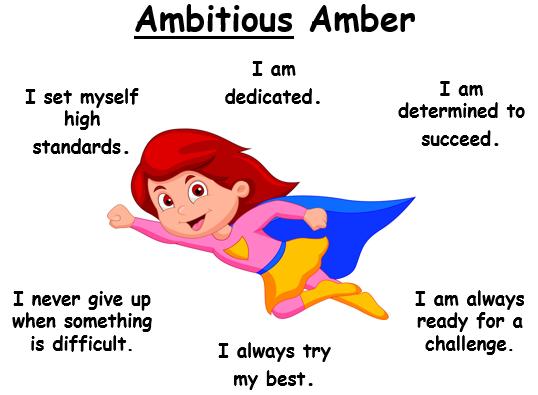
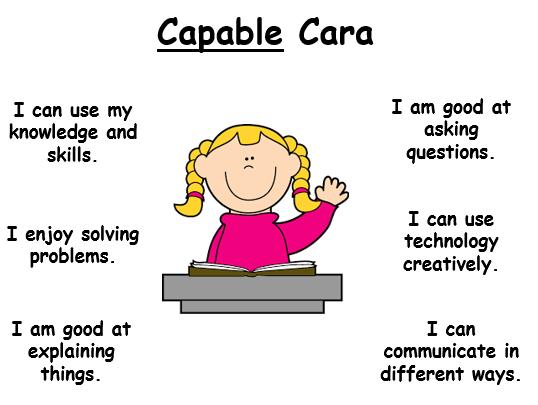
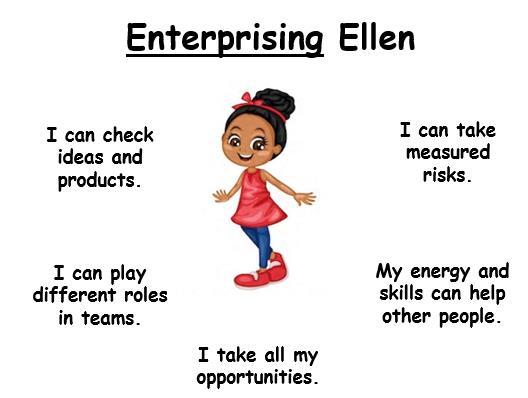
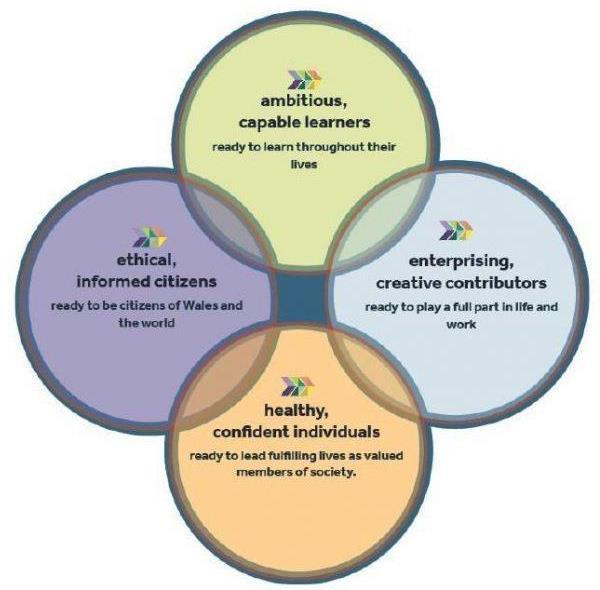

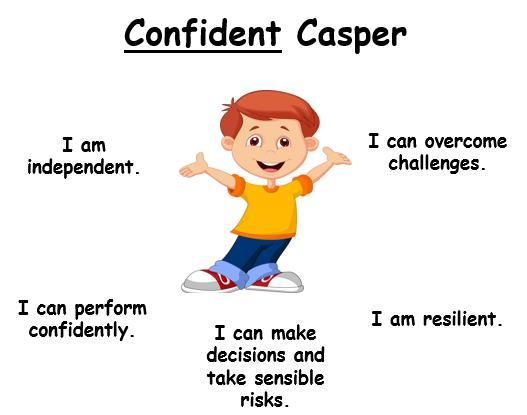

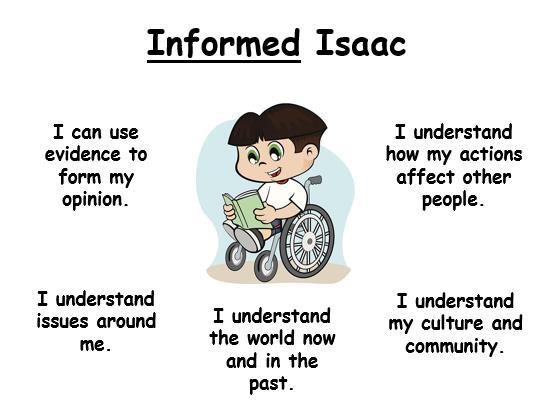
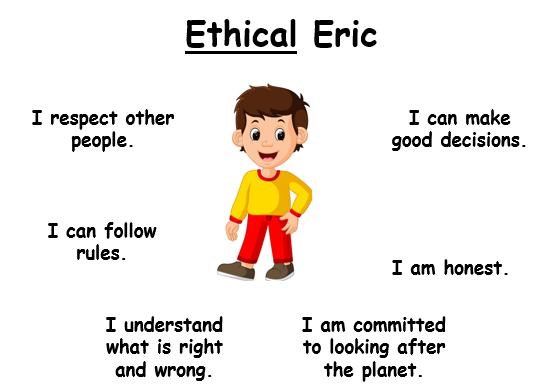
The Curriculum for Wales gives us the freedom to design a curriculum for pupils at Libanus Primary School. We have consulted pupils, parents, governors and the community when designing a curriculum that is relevant to our pupils. Our curriculum is based on the following:
Expressive Arts Health & Well-being Mathematics & Numeracy Humanities Language, Literacy & Communication
• Art
• Music
• Drama
• Dance
• Digital Media
• Physical Health & Development
• Mental Health
• Emotional & Social Wellbeing
• Conceptual understanding
• Communication using symbols
• Fluency
• Logical reasoning
• Strategic competence
Diversity Relationships and sexual education
• Geography
• History
• Religion, Values & Ethics
• Social Studies
• Business Studies
• English
• Welsh
• International Languages
• Literature
Science & Technology
• Biology
• Chemistry
• Physics
• Computer Science
• Design & Technology
5 Cross-cutting Themes
Human Rights Careers & workrelated experiences
Local, National & International Contexts
Literacy
3 Cross-curricular skills
Numeracy
Digital Competency
At Libanus Primary School we aim to provide both a broad and balanced curriculum whilst meeting the needs of all our pupils. Our staff use a range of teaching and learning strategies along with high quality resources and a range of targeted support to fully support ourpupilstoparticipateintheir mainstreameducation. Weadoptafullyinclusiveapproachto education combined with a universal learning provision that is able to meet a broad range of interests, learning styles and educational needs to support and challenge our pupils.
If a pupil experiences more complex barriers to learning and their specific need is additional to and substantially different from their peers, we work collaboratively with the pupil, staff and parents using pupil centred practice to develop appropriate support.
Libanus Primary School have worked closely with schools in the Blackwood Cluster to develop a cluster approach to curriculum design. While we retain our own individuality and ensure our curriculum is relevant to Libanus pupils we ensure that there is a consistency of skills.
At Libanus Primary School the purpose of assessment is to support each individual learner to progress at an appropriate pace, ensuring they are supported and challenged accordingly.
The three key reasons we assess are to:
• support individual learners on an ongoing, day-to-day basis
• identify, capture and reflect on individual learner progress over time
• understand group progress in order to reflect on practice
The focus on assessment is to identifying where the learner is in their learning, their next steps and the support or challenge needed to move forward in their learning. We use a wide range of assessment strategies to support learners on a day to day basis (formative assessment). We also use a range of summative assessments to identify, capture and reflect on learner progress over time. These include reading, spelling, numeracy and well-being assessments. Parents will be kept informed of their child’s progress through parent consultations and end of year pupil reports.
AtLibanusweusetheDescriptionsofLearningforeachWhat’sMattersStatementstoensure we plan for learners’ progression. At Libanus we use a stage not age approach but the Descriptions of Learning broadlycorrespond toexpectations of pupils aged 5, 8, 11, 14 and 16. We do not use these as a tick list of what pupils can do but as tools to assist with planning. TherearePrincipalsofProgressionthatunderpintheplanningforlearners’progressovertime.
At Libanus Primary School we are a fully inclusive school and we work with the local authority to ensure that the needs of pupils with disabilities are met.
As stated by the Welsh Government RSE is a positive and protected part of the Curriculum for Wales. It plays a central role in supporting learners’ rights to enjoy fulfilling, healthy and safe relationships throughout their lives.’
We believe that arights and equity based RSE curriculum supports all children’s freedom, dignity, wellbeing and safety. Our RSE curriculum provides the knowledge, skills and values for children to understand how relationships and sexuality shape their own and others’ lives.
We use the mandatory RSE Code to support the content of RSE across the school.
The content is set within the context of broad and interlinked learning strands:
● relationships and identity
● sexual health and well-being
● empowerment, safety and respect
Learning about rights and equity runs through all the strands, as well as embedding learning and experience through a rights-based approach to the learning. These will be taught and explored through a variety of specific lessons and curriculum themes and will be developmentally appropriate for all children. RSE is mandatory and all children will receive this as part of our RSE Curriculum. There will be no right to withdraw from RSE from September 2022
ThestaffatLibanus Schoolarekeenfor pupilstoreceiveawidevarietyofexperiences,both in and out of the classroom.
Here are just some of the activities that take place outside of the classroom:-
Football, Choir, Netball, Art and Craft, Film Club, Rugby, Cross Stitch.
Parentswillbenotifiedoftheirchild'sinvolvementinanyoftheseactivities,andoftimesand dates of meetings.
Educational visits are a very important part of the curriculum, enhancing the learning experiences of the children and broadening horizons. Our visits are carefully planned to fit the themes or to develop the learning in a particular subject. For examples, when studying World War 2 we visit the Imperial War Museum. We also plan regular residential trips to Cardiff Urdd, Manor Adventure, Dolygaer and PGL to develop our pupils as Libanus Adventurers.
Visitors have a valuable role to play and can contribute too many aspects of the life and work of our school. They deliver talks, workshops and full day activities across a wide range of subjects,givingpupilsaccesstooutsideexperiencesandexpertise.Visitorsprovidealinkwith the wider community; children have the opportunity to work alongside poets, musicians, authors, health professionals and many others.
We conduct a daily act of collective worship of a broadly Christian nature. We also explore famous days in history and events in the news. During this time, children will learn about aspectsofbiblestoriesandbiblicalfigures,issuestodowithworldreligions,historicalevents and the contributions of important people. They have the opportunity to reflect on what they have learned and consider how it affects their own life. We sing songs and say prayers. In addition, we also hold regular class assemblies where we invite parents to join us.
Home Learning can make an important contribution to a child’s progress at school. As well as reinforcing learning in the classroom, Home Learning helps children to develop the skills and attitudes they will need for successful independent lifelong learning. Home Learning is available on our online platform via Hwb.
At Libanus Primary School, we recognise that all individuals have fundamental human rights and we do our utmost to ensure everyone participates in all aspects of life within school by promoting initiatives that remove barriers and by actively promoting equality and social inclusion.
• We do not discriminate against anyone.
• We promote the principals of fairness and justice for all, through the education that we provide in our school.
• Weensurethatallpupilshaveequalaccesstothefullrangeofeducationalopportunities provided by the school.
• We constantly strive to remove any forms of indirect discrimination that may form barriers to learning.
• We challenge stereotyping and prejudice whenever it occurs.
• We celebrate the cultural diversity of our community and show respect for minority groups.
• Throughpositiveeducationalexperiencesandsupportforeachindividual’spointofview, we aim to promote positive social attitudes and respect for all.
We strive to provide a caring ethos where everyone in the school community feels safe, confident,valuedandrespected.Promotinganenvironmentwhereeveryonecanworktogether in a supportive way enables all to reach their full potential emotionally, socially and intellectually.
The primary aim of our Behaviour Policy is to promote good behaviour. We are aPivotalschool and we follow the Pivotal approach to behaviour management. Staff have high expectations, are goodrole modelsand reward pupils in order promote good behaviour. We have three rules that promote good behaviour. Our
Libanus Primary School is committed to safeguarding and promoting the welfare of children, and we expect all staff and volunteers to share in this commitment. Staff work hard to maintain an environment where children feel safe and secure.
There are three main elements to our policy:
• Prevention through the teaching and pastoral support offered to pupils.
• Procedures that clearly outline the expectations of all parties.
• Support for pupils who may be a cause for concern, appear vulnerable or have experienced a type of abuse.
At Libanus Primary School we promote and encourage pupils’ active citizenship and positive contribution to the school and wider community. We offer lots of opportunities for pupils to takeonnewresponsibilitiesandbe involvedinsuccessfullysupportingthelifeandworkofthe school. These include electing representatives on our School Council, Eco Council, Sport’s Council, Digi Council, Heddlu Bach and Criw Cymraeg. Year 6 pupils also volunteer to become Prefects. We hold annual elections where Year 6 pupils may nominate themselves as a candidate, prepare and deliver a manifesto to all pupils from Year 2 to Year 6. These pupils and staff vote for Head Pupils each academic year
The uniform is as follows:
Nursery:
Maroon jogging suit with optional school logo
Light blue polo shirt
Plain black shoes/trainers with Velcro fastenings
White/grey/black socks or tights
Reception to Maroon sweatshirt with optional school logo
Year 6
Light blue polo shirt with optional school logo
Light grey trousers/skirts
Black shoes
White/grey/black socks or tights
Uniforms with logos can be purchased from A.J.M Embroidery.
All garments, including coats should be clearly marked with your child's name, so that if an item should get lost, it is much easier to trace the owner.
Make-up, nail polish or jewellery should not be worn to school, for reasons of safety. Pupils may wear:
• A traditional watch or Fitbit, but nothing that enables the wearer to record conversations or events.
• Small objects of religious or medical significance (with prior agreement from the head
teacher).
At Libanus Primary School we pride ourselves in high standardsof uniform, including P.E. kit. On P.E. days pupils are able to wear their P.E. kit to school.
P.E. kit is as follows:
Blue school polo shirt
Plain black leggings/joggers/shorts with no coloured/white logo.
Plain black trainers with no coloured/white logo or soles.
We take our role in promoting and developing an understanding of healthy lifestyles very seriously.WehavebeenawardedtheLocalPhase6oftheHealthySchoolsScheme.Wedonot allow sweets or chocolate as snacks. Pupils in Nursery receive fruit snack each day. Pupils in Reception – Year 6 are able to bring a piece of fruit from home to eat during break time Researchshowsthatourbrainsneedwatertostayactiveandalert.Allchildrenareencouraged to bring water into school, in a spill-proof plastic bottle that they can take home at night to rinse and refill.
The head teacher will discuss the best way for you to volunteer. All volunteers working in school are required to have an enhanced Disclosure and Barring Service check though Caerphilly County Borough Council.
Schools are legally required to provide meals that comply with the School Food Standards. These standards are intended to ensure that children get the nutrition they need across the wholeschooldayandgovernallfoodanddrinkonofferwithintheschool.Menusareondisplay on the school hall and in all classrooms. All pupils are given a choice of meals during morning registration and given an orange or yellow band to show their choice. Parents can choose not to take-up a school lunch for their child, in which case children should bring a healthy packed lunch to school.
At present all pupils are provided with a free school meal each day by Welsh Government.
All pupils in Phase 1 and 2 (Nursery-Year 2) are provided with a free carton of milk each day by Welsh Government.
Thereisabreakfastandafter schoolclubonsitethatisrunindependentlyby Playworks.For more information regarding this service please contact Play work directly on 02920864780.
If your child is unable to attend school or nursery for any reason please telephone the school office to let us know. If your child has sickness or diarrhoea we ask that he/she does not return to school for 48 hours as this type of illness can be very infectious. We monitor attendance very closely.
If your child needs medical attention during the day, a member of staff is always on hand to provide sympathy and treatment. Local Authority regulations will only permit us to clean wounds. However, we will contact you if we consider the matter to be serious. Please ensure we have an emergency phone number, just in case!
We are unable to administer short term medicine to your child. E.g. Calpol, antibiotics etc. Childrenwhohavelongtermmedicalneedse.g.asthma,diabetes,epilepsyetc.areabletobring medication into school and these will be stored in a safe place. Parents will be asked to sign a consent form to give permission for medication to be taken.
From time to time, all families will experience problems of one sort or another, such as domestic troubles or bereavement. If your child is likely to be upset by something that has happenedathome,pleaseinformuspromptly,sothatwecanbepreparedifyourchildbehaves differently in school. It will be easier for us to support your child through a difficult time, if we know what has happened.
Anything you tell us will, of course, be treated in the strictest confidence. Please let Mrs Williams know if there is anything she can do to help.
Wehaveadedicatedroominschoolcalledthe‘Cwtch’whichprovideschildrenwithasafeplace to go if they need additional well-being support.
We operate a no-smoking policy. Smoking is not permitted anywhere within or near the school or grounds.
Due to health and safety issues we are unable to allow dogs on the premises, unless they are Assistance Dogs.
The Complaints Policy is available from the School Office and our School website. Any minor problems relating to school matters should be discussed with the class teacher. Any other complaint or more serious issue should be brought to the attention of the head teacher. If the complaint is not resolved, a formal complaint may be made to the Chair of Governors
At Libanus Primary we are constantly seeking to enrich the children’s learning experiences through trips and by inviting visitors and experts to talk to the children and by running activitiesandworkshops.Wherepossible,teacherslookforfreeactivitieshowever,thereare times when we have to request a voluntary contribution from parents.
We take school security extremely seriously. We have CCTV on site which is monitored both in school and by the local authority. All gates are locked during the school day and monitored by CCTV during this time. Entry by visitors is via Gate 3 and all visitors are asked to sign in. If you need to speak to the office staff please ring school.
Please try to ensure your child is in school by 9.00am, to ensure that the class day can start promptly without interruptions. All children who arrive after the gates have closed need to be accompanied to the office to by their parents.
Autumn Term 2023
• Term starts Friday 1 September 2023 (INSET Day)
• Half term starts Monday 30 October 2023
• Half term ends Friday 3 November 2023
• Term ends Friday 22 December 2023
Spring Term 2023
• Term starts Monday8 January 2024
• Half term starts Monday 12 February 2024
• Half term ends Friday 16 February 2024
• Term ends Friday 22 March 2024
Summer Term 2023
• Term starts Monday8th April 2024
• Half term starts Monday 27th May 2024
• Half term ends Friday 31st May 2024
• Term ends Friday 19th July 2024